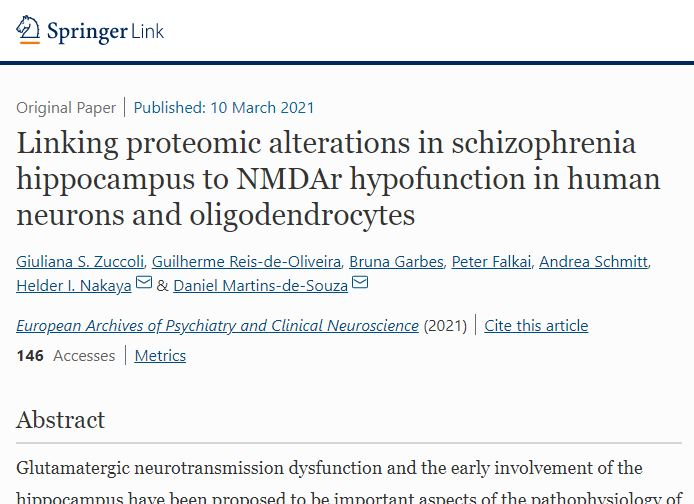Linking proteomic alterations in schizophrenia hippocampus to NMDAr hypofunction in human neurons and oligodendrocytes.
Glutamatergic neurotransmission dysfunction and the early involvement of the hippocampus have been proposed to be important aspects of the pathophysiology of schizophrenia. Here, we performed proteomic analysis of hippocampus postmortem samples from schizophrenia patients as well as neural cells-neurons and oligodendrocytes-treated with MK-801, an NMDA receptor antagonist. There were similarities in processes such as oxidative stress and apoptotic process when comparing hippocampus samples with MK-801-treated neurons, and in proteins synthesis when comparing hippocampus samples with MK-801-treated oligodendrocytes. This reveals that studying the effects of glutamatergic dysfunction in different neural cells can contribute to a better understanding of what it is observed in schizophrenia patients' postmortem brains.
Authors
Giuliana S Zuccoli; Guilherme Reis-de-Oliveira; Bruna Garbes; Peter Falkai; Andrea Schmitt; Helder I Nakaya; Daniel Martins-de-Souza
External link
Publication Year
Publication Journal
Associeted Project
Network & Precision Medicine
Lista de serviços
-
Is the gut microbiome key to modulating vaccine efficacy?Is the gut microbiome key to modulating vaccine efficacy?
-
Toxicogenomic and bioinformatics platforms to identify key molecular mechanisms of a curcumin-analogue DM-1 toxicity in melanoma cells.Toxicogenomic and bioinformatics platforms to identify key molecular mechanisms of a curcumin-analogue DM-1 toxicity in melanoma cells.

